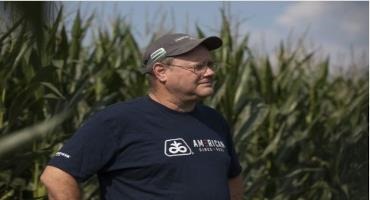Operational missteps put Indigo Agriculture on the outs with farmers in its early days. It is revising its offerings, and now old-line giants are implementing their own tech products for grain and carbon trading.
When a Boston-based tech startup showed John Creighton one of the best prices for his corn he’d seen in years, the farmer signed up to sell 75,000 bushels through its network.
What followed were months of headaches. The company’s paperwork, which farmers rely on to track grain quality and deliveries, was a mess, Mr. Creighton said. Trucks sometimes arrived at the farm to make pickups in the middle of the night, and several loads of his grain went missing. Months passed without full payment on the grain, versus the 72-hour turnaround with local elevators. He was paid, he said, after threatening to complain to regulators.
“They had a great sales pitch,” said Mr. Creighton, who farms in Illinois and dealt with Indigo in 2019. “It turned into a complete cluster.”
The source of Mr. Creighton’s frustration was Indigo Agriculture Inc., a startup that had set its sights on the U.S. Farm Belt with an idea to use cutting-edge technology to reshape the agriculture industry.

Instead of selling directly to local co-ops or to the handful of enormous companies that buy grain, farmers could use a platform to find buyers anywhere and pick the best price offered. Indigo would also market special microbes to make seeds more productive, and farmers could enter a program to sell what they produced from those at guaranteed, premium prices.
Executing that vision created chaos, say some farmers who worked with the company. Indigo, which has led the pack of U.S. ag-tech startups with investments of $1.1 billion, stumbled on operational and technological mistakes, combined with repeated strategic shifts and rapid expansion, according to current and former employees.
The underlying idea is getting traction—applying aspects of digital marketplaces to bring buyers and sellers together. Some of the world’s largest agricultural companies, including Cargill Inc. and Archer Daniels Midland Co. , are developing their own online venues for farmers to market grain. Another plan Indigo is working to get off the ground, a program for farmers to sell carbon credits, is also one that more established companies have latched on to, including Bayer AG, Nutrien Ltd. and Land O’Lakes Inc.

Ron Hovsepian, who took over as Indigo’s CEO in September, said the company has improved its response time with farmers and is committed to earning their trust. He said the company has improved the way its platform manages and tracks grain transactions, logistics and payment details.
“I feel really good that we’re on the right track now,” Mr. Hovsepian said.
Technology has transformed farming, from satellite-guided tractors to seed-selecting algorithms and crops developed with gene-editing techniques. The traditional grain-trading marketplace has also started to shift as farms get larger and larger, giving farmers more clout with buyers.
Since 2009, nearly $23 billion has been invested globally in new companies using technology in agriculture, according to market research firm PitchBook Data Inc.
Indigo has taken in a big portion of that, according to research firm AgFunder, including more than $500 million announced last year from investors including FedEx Corp. and the Alaska Permanent Fund.
Founded by Flagship Pioneering, the venture-capital firm that formed vaccine-developer Moderna Inc., Indigo started in 2013 under the name Symbiota, focused on developing microbes that could be applied to seeds to produce hardier, higher-yielding crops. The product was pitched as an environmentally friendly alternative to the chemicals and irrigation used to help crops absorb nutrients and survive drought.
David Perry, a health-sector entrepreneur who previously had co-founded and led biopharmaceutical maker Anacor Pharmaceuticals, was hired as the company’s first permanent chief executive in January 2015, and the company name later changed to Indigo. Mr. Perry, who left Indigo last September, didn’t respond to requests for comment.
In 2016, Indigo raised $100 million, touting the sum at the time as the largest-ever private-equity financing in the agriculture-technology sector. To catch farmers’ attention, Indigo mailed out digital tablets loaded with videos and links—fancier giveaways than farmers were used to seeing.
It introduced a program paying farmers premium prices to grow the company’s specialized crop varieties—farmers would use the microbe-treated seeds, then could sell the crops to Indigo and other buyers looking for specialized, sustainably grown varieties.
It seemed like Indigo had everything Blake Stringer, a Dumas, Texas-based farmer, was looking for: a good price for soybean seeds, attractive financing and a premium price for the harvested beans. Mr. Stringer filled out a credit application in 2018 and placed a $35,000 order.
When he asked Indigo a week later when his seeds would arrive, the salesperson explained that Indigo bought seed from a third party to treat with its microbes, and it would likely be another three to four weeks.
Click here to see more...